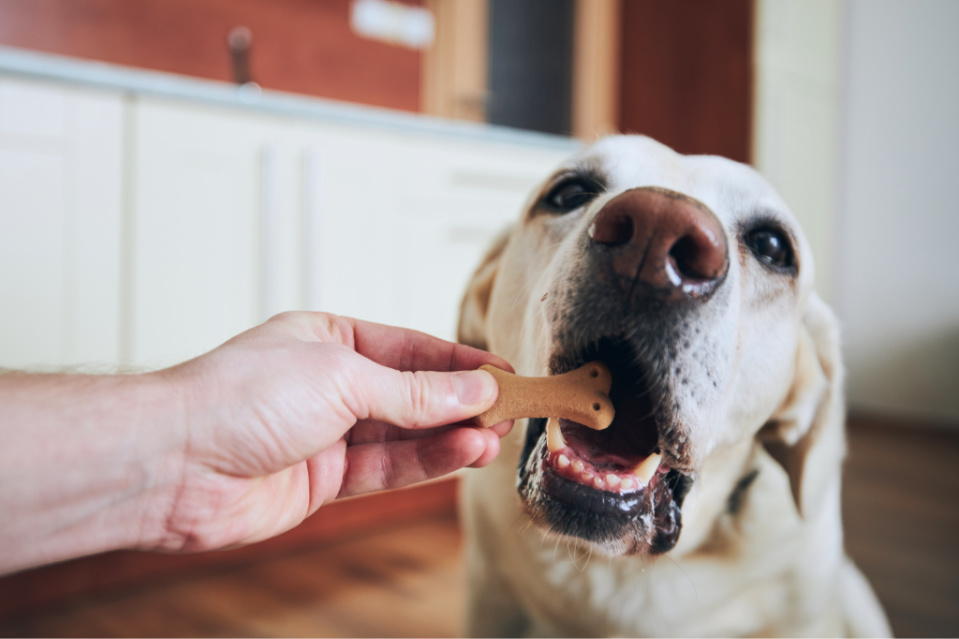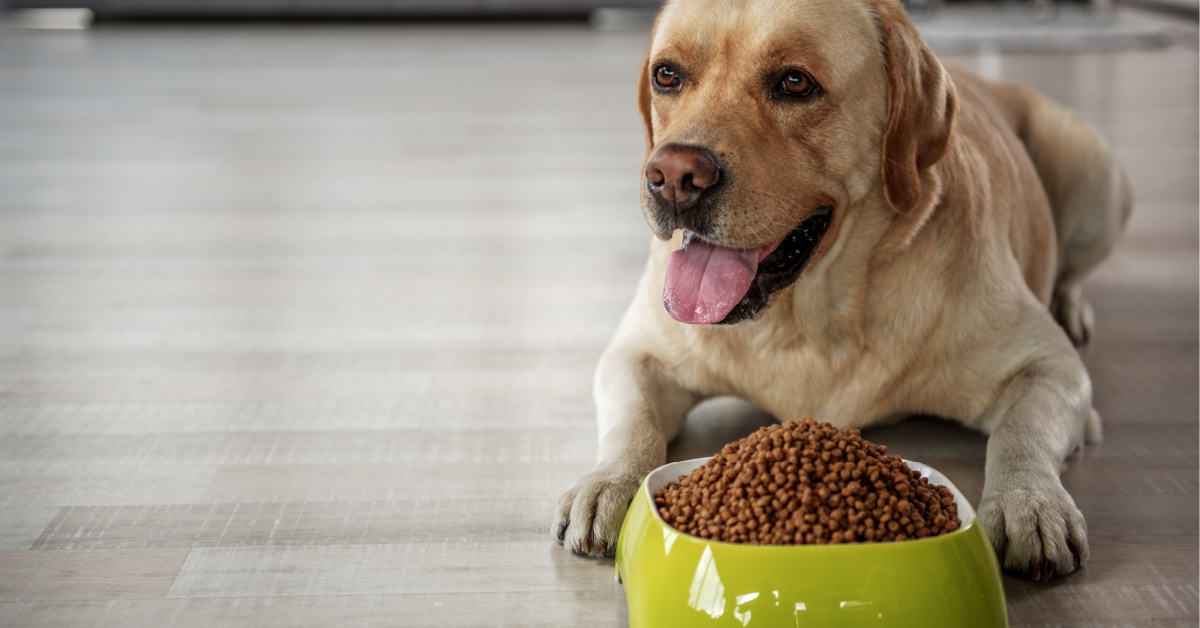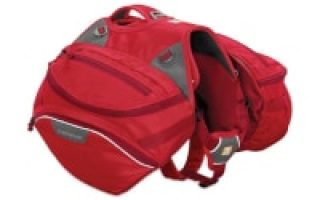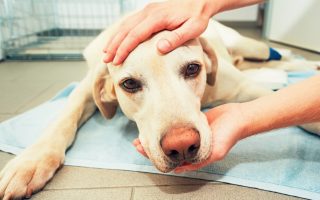If you have a Labrador, you probably already know that they love food. In line with this, you might be wondering what foods Labradors like to eat, what the best diet is for them, and what they should not eat, among others.
So, we have rounded up some diet tips in this Labrador feeding guide to help you determine what Labradors can eat to help them stay healthy.
What can Labradors eat?
Labradors like to eat nearly any kind of food they can get their paws on.
But, if you’re giving them human food, below is a list of foods that Labradors can eat.
Just keep in mind that they should eat these in moderation. Some of these treats should not substitute a proper meal.
Peanut butter
This is the number one favorite treat of most dogs. They even love the smell, which is why your Lab may jump for joy when they see you opening a jar.
Peanut butter is full of protein, vitamin B, vitamin E, healthy fats, and more. Be sure to only give them natural, unsalted, raw peanut butter that has no extra preservatives or sugar.
Cheese
If your Lab is lactose-tolerant, they will love to snack on cheese.
Ideally, however, they should only snack on reduced-fat to low-fat cheese and only eat this at very seldom times.
Cooked chicken
If you want to add more protein and flavor to your dog’s regular diet, you can add cooked chicken.
If you run out of regular dog food, boiled and shredded white chicken meat can make a quick and healthy replacement.
Salmon
Surprisingly, salmon makes a great snack for dogs. It has lots of protein and omega 3 fatty acids, which boost your Lab’s immune system and keeps their coat shiny and healthy.
Just make sure that you only give them cooked salmon. You could also put salmon oil into their regular food.
Baby carrots
Baby carrots are a great low-calorie treat for Labradors since they are full of vitamins. Plus, it is good for their teeth, so Lab puppies can snack on baby carrots during their teething phase.
Eggs
Another healthy snack full of protein that your Labrador Retriever may love is eggs.
When you scramble their eggs, make sure you do not use oil or butter. Just use a nonstick pan to cook the eggs.
Yogurt
Yogurt has lots of protein, calcium, and probiotics that are great for your Labrador.
Make sure to only give them yogurt that is free of added sugars and artificial flavors.
Apple slices
Think your dog needs to freshen their breath? Let them munch on some apple slices to help freshen their breath and remove excess residue on their teeth.
Keep in mind, however, that you should always remove the core and seeds because your Lab could choke on them.
What is the best diet for Labradors?

Honestly, most dog experts and veterinarians may not agree about what the best diet for Labradors are.
There are so many different kinds, and each kind of dog diet has its own benefits.
However, most experts will agree that a diet high in protein and has enough vitamins, minerals, carbohydrates, and fats is great for dogs.
Bear in mind that you should never give your Lab a new diet out of nowhere since the chances are that it will upset their stomach.
You should only gradually introduce them to any new diet while decreasing the amount of the old one so that their body will have time to adjust.
Here is a quick guide to the pros and cons of some common diets that your Labrador Retriever could try.
1. Dry food (Kibble)
A huge benefit of kibble is that it is convenient. You can easily store it and feed it to your dog. There are also different brands and formulas that you can choose from for your Lab.
However, you need to steer clear of most cheap brands for dry kibble. Those dry kibble brands are usually full of additives, preservatives, and even ingredients that could harm your dog.
Consequently, it is vital that you always look at the ingredients of your dog food and to do your research before making a decision to purchase any dry dog food brand.
Additionally, you need to make sure that your dog gets enough water. Dry dog food has little to no moisture in it, so you may have to increase their water intake.
Try adding wet food to their diet and giving them lots of water every now and then.
2. Wet (canned) food
Compared to kibble, wet dog food usually has fewer carbohydrates in it. This makes it likely for your Lab to become overweight.
Additionally, wet food is usually convenient in that all you have to do is just to open the can and put the food into their bowl.
A lot of canned food uses frozen or fresh veggies and meat. Plus, it may be enough to give your Lab the nutrients they need.
Wet dog food usually smells great for your dogs but is terrible for humans. So, you may have to grin and bear the stench every time you feed your Labrador Retriever.
Additionally, canned wet food is usually more expensive, especially when you have to feed a big Lab.
However, it is also important to be very wary of cheaper wet food because cheap canned food brands for dogs can have low-quality meat byproducts.
3. Home-cooked food
Homemade dog food can be a mixture of raw and cooked food, or only cooked food. It is up to you, but it usually takes some planning to make a good plan for the best foods or diets for your Lab.
Home-cooked dog food usually has way more nutrients than store-bought food. Add to that the fact that you know exactly what you are putting into your dog’s body with home-cooked dog food, it’s no wonder why Labs usually love its taste.
Making a home-cooked dog food can be tricky, though, especially for first-timers.
You need to create a balanced diet by yourself and make sure that the ingredients are fresh and safe for your Lab. You will also have to put aside time to prepare, cook, and store the food.
4. Raw diet
A type of diet for dogs that has recently gone trending is the raw food diet. The idea is to make your dog’s diet go back to their “natural” diet.
While there is some debate about whether this diet is ideal, your dog may be fine if you choose natural, organic ingredients and store them properly. Additionally, it would be best to consult a veterinarian for help on whether your Labradors like to eat raw food.
One good thing about the raw diet for your Lab is that it could help keep your Lab at a healthy weight.
You can also keep track of what they eat even when you buy some raw options from the store if you do not always have the time to make a food plan.
However, one disadvantage of this type of diet also is that your Labrador Retriever could get problems like diarrhea or infections.
If you are not careful, the ingredients you buy may contain parasites and bacteria. In fact, dog experts strongly recommend that pet owners of dogs with conditions like cancer, avoid giving their canine companions a raw diet.
How much should I feed my adult Labrador?
It mostly depends on your Lab’s age, dietary needs, health concerns, weight, and how active they are.
Most people agree that you should feed your Labrador 3 cups of food a day if they are 60 pounds. You can add roughly ¼-½ cups more to that amount for every extra 10 pounds they weigh. For example, they can eat 4-4 ¼ cups of food a day if they are 90 pounds.
How much should I feed a Labrador puppy?
The answer to that depends on your pup’s age.
Typically, your one-month-old puppy will not be fully weaned, so you will slowly introduce them to dog food.
You can do this by mixing small amounts with water. For example, you can give them ¾ cup of water with ¼ cup of dog food.
Most Labrador puppies will need to eat at least 2-3 cups of food a day after they are fully weaned from their mothers.
You can increase or decrease that amount slightly as needed. Just remember not to increase it suddenly because Labs are prone to obesity.
Best dog food for Labrador puppies
A very popular dog food brand for Lab puppies is Royal Canin Labrador Retriever Puppy dog food. It is specially formulated to address all the Lab puppy’s needs. They can eat this when they are 2-15 months old.
If you want a more budget-friendly option, you can also try the Purina Pro Plan Large Breed Puppy. It has lots of protein and helps manage your puppy’s weight.
For more dog food choices, check out our recommendations here.
Best dog food for Labradors with skin allergies
Ideally, you should ask a veterinarian for the best dog food for your Labrador’s specific allergies.
However, a popular choice is Hill’s Science Diet Sensitive Skin and Stomach. It has tons of omega fatty acids and antioxidants. It is also easy to digest.
Best dog food for overweight Labradors
There is a special dog food for overweight dogs that is low in calories and fat but high in protein. However, we advise that you ask a vet for the best brand, especially if your Lab has other medical conditions.
On the other hand, if your Lab is a bit on the chubby side with no health issues, you can try Blue Buffalo Life Protection Healthy Weight. It has a fat-to-protein-ratio of 45%, which makes it excellent for weight loss.
What foods to avoid for Labrador Retrievers?
Just as there is a best dog food for shedding and non-shedding Lab, there are also some foods or diet that can be poisonous for dogs.
Here is a quick list of the common foods that they should never eat:
- Caffeine and chocolate
- Raisins and grapes
- Garlic and onions
- Apple seeds, cherry pits.
- Candy
- Avocado
- Salty food
- Processed, junk food
You can see more the foods that you should avoid for your Labs here.
In conclusion
Your Lab will love healthy treats like peanut butter, cheese, chicken, and more. You can also slowly try out new diets like a home-cooked diet to figure out what your Labradors like to eat that can also help them be healthier.
Ideally, however, you should make sure to talk to a vet before choosing the best diet for your Labrador.
If you’re in the search of the best affordable dog food for Labs, you may also try checking out our post here.







